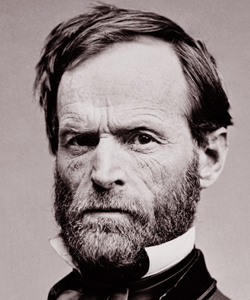
We committed to this course in 1968, when America elected Richard Nixon on just such a platform. Order at home, American order abroad. Vietnam was a Cold War activity, and even before it ended we had started another one, in Afghanistan, a war that even a Nobel Peace Prize winner, Barack Obama, has found unable to end “with honor.”
Peace with honor, to Americans, means peace with a promise by the other side not to attack us again. We left Vietnam, the North took over, but they have kept that promise and we have no problems with them today. Afghans won’t make that promise. They never have, they never will. So that war goes on.
What of the war back home? That war seemed to end in the 1970s, but it never really did. It remained a low-grade conflict under many names, the most common being The War on Drugs. The name of the drug changed, but the battlefield never did. It was poor people, brown people, often Hispanic people that generations learned to fight, hate and fear.
In 1864 the Civil War seemed intractable. It had been hiding under the tables when the Constitution was written. Slavery’s hands are all over the document. So that war had been going on, with increasing intensity, for a lifetime by 1864’s battles. That was to be war’s bloodiest year, and the outcome wasn’t certain until the November re-election of Abraham Lincoln. That result was made certain by some of the bloodiest battles of the war, especially one that destroyed my own home, Atlanta, and which is still remembered with an annual celebration that is taking place now.
In 2016 the Second Civil War also seems intractable. So, too, the foreign war. But as in 2016 we may be closer to the end of both than we realize.

This has been a very bloody year, and a very uncertain year, in the global conflict. ISIS is being pressed in its self-described Caliphate, and has called on its followers around the world to attack everyone with everything they have. The result has been to unite the world against ISIS, in a way it has not been united before. ISIS has not just attacked the West, through proxies and claimants, in places like Brussels and Orlando. It has also attacked organized Islam, in Istanbul, in Dhaka, most crucially in Medina, in Saudi Arabia itself.
What seems to us as strength is an acknowledgement of weakness. ISIS has run out of allies. What it has left are those angry young men its propaganda can convince to strike in its name. Cyberwar is neutralizing that. ISIS is becoming less an organized force than a semi-organized criminal gang. It will be crushed between the wheels of Islamic dictatorships and Western law enforcement. Once ISIS is gone we can deal with the dictatorship and overreach made necessary by the violence of the war.

This Civil War is based on what I have long called the Nixon Thesis of Conflict, a set of political assumptions that see opponents as inherently illegitimate, as enemies that must be destroyed. To those who follow the Nixon Thesis, only absolute loyalty is enough, loyalty to a Noble Cause as false and fractured in its way as the Lost Cause of the Confederacy. This is not anti-Democratic. It is profoundly anti-democratic.
The Noble Cause is not a cause of hoop skirts and mint juleps, but of Chevys and barbecues, of men who work hard for a living, of women and children who obey them. It’s based on an idealized version of the 1950s, that brief moment when the country was united by the Cold War, when suburbs were growing, and when the domination of white, blue collar working men was unquestioned.
Both the Lost Cause and the Noble Cause are dreams framed on lies. The Lost Cause was based on slavery, which degraded white and black alike. The Noble Cause is based on Jim Crow, on pre-feminist women, on kids who obey their parents and preachers without question.

They say that what history writes first as tragedy comes back as farce, and 2016 is in many ways a farcical version of 1968. Trump is a farcical version of Nixon or Wallace, a jazzman who intuits the sound but can’t really carry the tune. His followers, too, are now a farcical version of the Confederacy, with their AR-15 worship, their refusal to be “politically correct” (meaning their inability to see their beliefs as obsolete), their weaknesses for food, drugs, and gasoline.

War is all hell, said William Tecumseh Sherman, in a letter to the mayor of Atlanta, written in September of 1864. It is a far more eloquent testimony than anything I could write, or that anyone has written since. The only way to live in peace and quiet at home, he wrote, is to stop the war, “which can only be done by admitting that it began in error and is perpetuated in pride.”
The war ends when the shooting stops, when the guns are put away, and when those of the Noble Cause surrender to the cause of the Union, represented by the Obama Thesis of Consensus . General Grant in this case is a short, aging veteran in a tunic and pant suit. You hand your sword to her, and you can go.










Glib. Self-satisfying. A man who has taken the trouble to work out a complete worldview only for to justify his own gut feelings (and delegitimate the gut feelings of his opponents). Lost labour.
His gut feelings may change at the moment when he is finally replaced by a foreign HB-visa worker.
A man who would never imagine that he occupies himself with the splinter in his brother’s eye and doesn’t consider the beam in his own eye (All this rubbish about Nixon – not the Roosevelt Democrats and their followers – as seeing “opponents as inherently illegitimate, as enemies that must be destroyed”.)
Glib. Self-satisfying. A man who has taken the trouble to work out a complete worldview only for to justify his own gut feelings (and delegitimate the gut feelings of his opponents). Lost labour.
His gut feelings may change at the moment when he is finally replaced by a foreign HB-visa worker.
A man who would never imagine that he occupies himself with the splinter in his brother’s eye and doesn’t consider the beam in his own eye (All this rubbish about Nixon – not the Roosevelt Democrats and their followers – as seeing “opponents as inherently illegitimate, as enemies that must be destroyed”.)
Well, that’s some projection above. I guess it’s never more “projecty” than when you’re accusing someone else of it.
One thing I notice, though, is that there’s also a libertarian strain to Trumpism of a particular white-guy sort. Lots of ’70s and ’80s rock dudes who once farmed hair and made Jim Marshall his millions (some of which are still doing it) have come out for Trump simply because they’re low-information voters who get all their perspective from Fox News–and they do that because someone they liked (Ted Nugent? Gene Simmons? Lynyrd Skynyrd?) got to them before the liberals did (who’d abandoned classic rock in the wake of punk–bad idea, that). You may notice that the Republican National Convention was in the same city as the Rock’n’Roll Hall of Fame, and the RNC even incorporated an electric guitar into their logo this year.
If the people they were in 1978 or 1984 could see what they’ve become (and there are more of them than you’d think) they might just deck themselves. They’re not even bad people now–they’ve just got a mental framework implanted in their minds that just won’t be budged. But maybe it was brewing underneath all this time. Certainly the Republican Party hasn’t been shy about using classic rock as bait for a big part of the white voting base–despite the protestations of many of the people who actually made that music.
Well, that’s some projection above. I guess it’s never more “projecty” than when you’re accusing someone else of it.
One thing I notice, though, is that there’s also a libertarian strain to Trumpism of a particular white-guy sort. Lots of ’70s and ’80s rock dudes who once farmed hair and made Jim Marshall his millions (some of which are still doing it) have come out for Trump simply because they’re low-information voters who get all their perspective from Fox News–and they do that because someone they liked (Ted Nugent? Gene Simmons? Lynyrd Skynyrd?) got to them before the liberals did (who’d abandoned classic rock in the wake of punk–bad idea, that). You may notice that the Republican National Convention was in the same city as the Rock’n’Roll Hall of Fame, and the RNC even incorporated an electric guitar into their logo this year.
If the people they were in 1978 or 1984 could see what they’ve become (and there are more of them than you’d think) they might just deck themselves. They’re not even bad people now–they’ve just got a mental framework implanted in their minds that just won’t be budged. But maybe it was brewing underneath all this time. Certainly the Republican Party hasn’t been shy about using classic rock as bait for a big part of the white voting base–despite the protestations of many of the people who actually made that music.